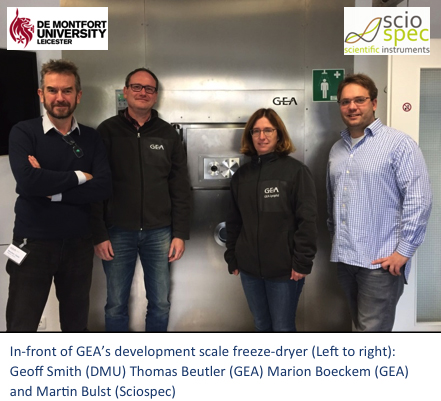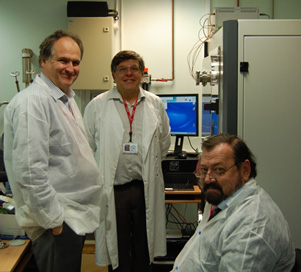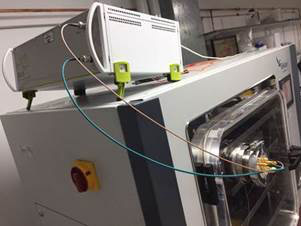News
Freeze-drying of pharmaceutical drug products
PhD Scholarship available
De Montfort University, Leicester, United Kingdom
(in collaboration with AstraZeneca)
Fees and full bursary paid (open to both Home and International Students)
The increase in marketed biologic drug therapies, over the last 30 years, and the recent diversification of molecular formats/modalities (from nanoparticles, antibodies, antibody-drug-conjugates, to mRNA vaccines) has resulted in significant demand for freeze-drying technologies and advanced process understanding, and for post-graduate scientists with specialist expertise in this area (creating opportunities for career development).
This PhD project (in collaboration with AstraZeneca, UK) seeks to provide a better understanding of the development of freeze-dried formulations and lyophilization processes through a combination of computational and/or experimental studies, including opportunities to work on:
• Drug formulation, freeze-drying process development, and end-product evaluation.
• The further development of process monitoring techniques (through-vial impedance spectroscopy/TVIS alongside temperature and humidity sensors) for critical parameter determination (product temperatures, heat transfer coefficients, dry layer resistances)
• The use of these in-situ tools to provide improved understanding of processes allowing optimised drying profiles and reducing the risk of technical transfer during scale up
• CFD and mathematical modelling of the freeze-drying process and the validation of classical physical models.
Our collaboration with AstraZeneca will include spending some time at their Macclesfield site, in the UK, to learn with hands on experience.
See PhD programmes for more general information on our PhD subject areas
For an initial expression of interest please submit your cv to:
Prof. Geoff Smith
gsmith02@dmu.ac.uk
4th Annual Pharmaceutical Lyophilization Summit in Prague May 12-13th 2022

Prof. Geoff Smith has been invited to give a podium presentation at the 4th Lyophilization Summit in Prague May 12-13th on an application for through-vial impedance spectroscopy in the determination of the true ice sublimation end point.
Single vial sublimation end points (i.e., end of primary drying) are routinely determined using a product temperature probe, whereby the “end-point defining characteristic” is the increase and ultimate stabilization of temperature as the process of ice sublimation completes. However, the sensor also detects the heat absorption due to water desorption from the solids fraction, and in the case of amorphous solids in particular, this generally results in an extension of the temperature profile, such that the overlap of the desorption process obscures the point when all the ice has been removed from the vial.
The recent development of through-vial impedance spectroscopy (TVIS) has enabled a more precise determination of the ice sublimation end point from pure water within single vials (Pandya et al. 2021). The question now (and the topic of this presentation) is whether TVIS provides an equally clear defining end point of ice sublimation from frozen solutions. The presentation will also highlight how the TVIS method might provide a qualification of the industry standard method for determining the primary drying batch end point, i.e., comparative pressure measurements from Pirani and capacitance manometer gauges.
Prof. Geoff Smith has been invited to give a podium presentation at the 2nd Lyophilization Summit in Vienna February 1st – 2nd 2018 on the novel process analytical technology “Through Vial Impedance Spectroscopy” in which he will explain its use in the determination of product temperatures (including the critical temperatures of Tg' , Teu, Tc) and drying rate, from which single vial heat transfer coefficients and dry layer resistances may be determined.

January 2018 DMU teams up with UCL on a PhD project funded by the EPSRC
Biopharmaceutical companies are using freeze-drying in order to optimise the shelf-life of formulated biological drug products (antibodies, blood products, vaccines etc.). However, the current development strategies for product formulation & production scale up are disjointed and based on a limited design space (few formulations & a narrow range of process parameters investigated). Most importantly, optimisation of formulation & process are not executed concurrently, which is a critical weakness. This project will develop applications for scalable process analytical technologies, based on through vial impedance spectroscopy and will correlate the characteristics of the protein solution during freeze-drying with various biophysical tests for protein stability.
Our successful PhD candidate, Mr Anand Vadessa, will be working with Prof. Geoff Smith in De Montfort University’s Pharmaceutical Technologies Group and Prof. Paul Dalby (Department of Biochemical , University College London) in the EPSRC Future Targeted Healthcare Manufacturing Hub on a project entitled “Scale Equivalence in the Freeze-drying of Biopharmaceuticals: The Drive Towards Process Efficiency and Protein Stability”
November 2017, Through Vial Impedance Spectroscopy installed at GEA Lyophil, Hürth, Germany
Geoff Smith (School of Pharmacy) has been collaborating with various industrial partners on a number of Innovate UK-funded collaborative R&D projects since 2008 (LyoDEA, 2008-2012; BioStart, 2014-2018; and AtlasBio; 2017-2020). These projects have led to the development of a novel instrumentation technology (Through Vial Impedance Spectroscopy, TVIS) for the optimization of production-cycles for freeze-dried, injectable medicines (proteins, antibiotics, vaccines etc.).
TVIS is based on well-known principles of impedance spectroscopy, however, this is the first time that impedance spectroscopy has been used to characterize materials within conventional glass freeze-drying vials, without having to insert the electrodes into the product, to provide a technique which is non-invasive to both the product and process.
De Montfort University’s prototype of TVIS has been successfully translated into a commercially viable instrument through our work with a specialist instrumentation company, Sciospec Scientific Instruments GmbH (Leipzig).

At the beginning of November, Geoff Smith visited GEA Lyophil in Hürth (near Cologne) to participate in the installation of TVIS technology on GEA’s development scale freeze dryer. The successful trial paves the way for GEA to begin using the technology in the development of production cycles for their clients in the biopharmaceutical industry. It is expected that the increased process understanding delivered by TVIS will accelerate product development and facilitate the creation of more stable products and more efficient manufacturing cycles, resulting in new drugs coming to market sooner and at reduced cost.
The GEA Lyophil installation follows three earlier installations of TVIS prototypes at AstraZeneca in Macclesfield (Feb 2014), the National Institute of Biological Standards and Control (NIBSC) in South Mimms, Potters Bar (Oct 2015) and at Sanofi in Waterford, Ireland (Nov 2016).
October 1 2015 Representatives from De Montfort University (Evgeny Polygalov and Geoff Smith) and GEA Pharma Systems (Julian Taylor) install a Through Vial Impedance Spectrometer (TVIS) at the National Institute of Biological Standards and Control (South Mimms, UK). The installation of the system was undertaken within the framework of the Innovate UK funded project called Biostart which is aimed at improving the formulation of room temperature stabilized biopharmaceutical products.
Dr Paul Matejtschuk, Principal Scientist in Standardisation Science at NIBSC said: ‘We partnered on this Innovate UK-funded research project as we believe in the importance of in-process monitoring to deliver better designed and suited lyophilisation protocols. We’ve found the TVIS technology a useful addition to the available toolbox used by scientists to monitor and better understand freeze drying processes.’

Left : Julian Taylor (GEA Pharma Systems); Middle : Paul Matesjtschuk (NIBSC); right: Evgeny Polygalov (De Montfort University).

TVIS instrument on the top of a Telstar LyoBeta dryer, showing the cabling to the pass-through connected to the port mounted on the front of the door of the dryer.
The National Institute for Biological Standards and Control (NIBSC) is a centre of the Medicines and Healthcare products Regulatory Agency, which is an executive agency of the Department of Health. As a WHO International Laboratory for Biological Standardisation, NIBSC produce over 90% of WHO International Reference materials used to assign biological activity. Most of these preparations are freeze dried to ensure stability. Other partners in the collaboration are Sanofi Ireland, OnkoLytika and BlueFrog Design Ltd.